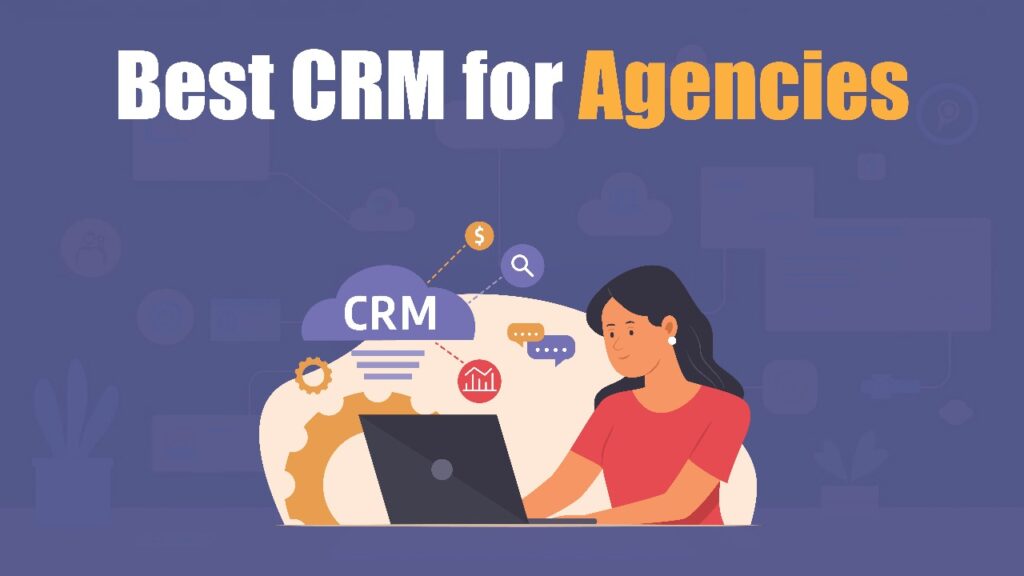Are you running an agency and finding it difficult to keep track of leads, clients, and campaigns all at once?
Do you feel your team spends more time toggling between spreadsheets, email threads and project tools than actually working with clients?
In today’s fast-moving agency world, a dedicated CRM (Customer Relationship Management) system can be the difference between being reactive and being proactive. It not only helps you organise relationships but also aligns your sales, service and delivery workflows in one place.
Let’s walk through what a CRM for agencies really looks like, why it matters, and how you can pick the right one before diving into the top 15 picks tailored for agency-use.
What is a CRM for Agencies?
A CRM for agencies is a specialised software platform designed to manage client relationships, track leads and monitor deals, while also integrating with project delivery and campaign tracking. It records every interaction from prospect outreach to service delivery, and then helps your team keep on top of tasks, statuses and hand-offs.
Unlike a generic CRM, agency-focused platforms emphasise multi-client workflows, hand-over between sales and delivery teams, and often link with tools for collaboration, billing and client communication. It becomes the single source of truth for your agency’s client lifecycle.
Why Agencies Need a Dedicated CRM?
Agencies face unique challenges: multiple clients, multiple campaigns, tight deadlines, overlapping tasks and frequent hand-offs between teams. Without the right system:
- you risk losing visibility of client statuses, missing follow-ups, and having inconsistent service.
- you limit your ability to scale, because what worked for one client may not standardise across many.
- you hinder cross-team collaboration, because sales, project delivery and account teams may be tracking different tools and metrics.
By using an agency-oriented CRM you achieve: consistent workflows, clarity on where each client stands, better pipeline forecasting, and ultimately a smoother process from prospect to project completion.
How to Choose the Right CRM for Your Agency
When selecting a CRM with your agency in mind, make sure to evaluate the following criteria:
- Ease of use & adoption: Your team should be able to get started quickly without heavy training. According to reviews, simplicity is a key factor in CRM tool success.
- Workflow & delivery support: Since agencies manage projects as well as sales, the CRM should support client-onboarding, delivery stages, hand-offs, and custom workflows.
- Integration with existing tools: Your CRM must connect with email, calendar, marketing tools, project management, and other systems you already use. For example, integration with Google Workspace is often highlighted for agencies.
- Scalability & reporting: As your agency grows, you’ll need richer reporting, multi-client dashboards, and data-driven insights. Make sure the CRM supports your future size and complexity.
- Budget & pricing flexibility: Agencies may start small but scale fast. A CRM with flexible plans or a free tier can help you start without high upfront cost.
10 Best CRM for Agencies in 2026
Here is 10 Best CRM for Agencies in 2026:
- HubSpot CRM
- Zoho CRM
- Salesforce Sales Cloud
- Pipedrive
- Monday.com CRM
- Insightly
- SuiteCRM
- Capsule CRM
- GoHighLevel
- Salesflare
1. HubSpot CRM
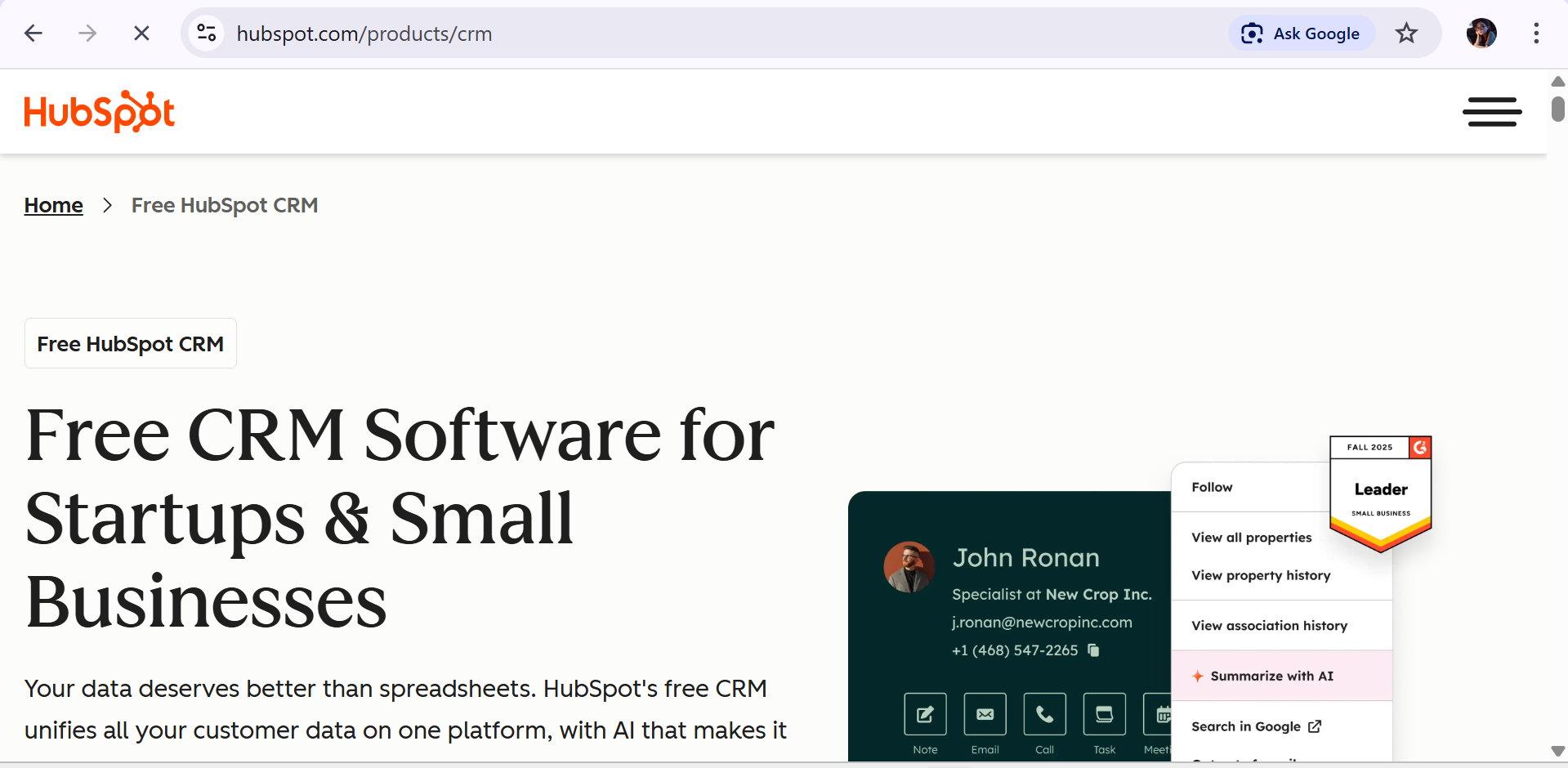
Review
HubSpot CRM is among the most popular and widely used CRMs for agencies, especially digital and marketing ones. Its free tier is very generous, offering contact management, deal tracking, and email integration. Agencies benefit from HubSpot’s ecosystem (Marketing Hub, Sales Hub, Service Hub) which lets sales, marketing, and delivery teams coordinate in one place. Because of its scalability, many agencies start with free HubSpot and later upgrade to paid hubs as they grow. Its clean UI and rich documentation make adoption easier for agency teams.
Features
- Contact & lead management
- Deal pipelines and custom properties
- Email tracking and logging
- Integration with marketing automation (HubSpot Marketing Hub)
- Reporting dashboards and analytics
- Task automation and sequences
Pros
- Free tier suitable for small agencies
- Unified platform for sales, marketing, and service
- Highly scalable as the agency grows
- Excellent integration ecosystem
- Good onboarding and educational resources
Cons
- Paid hubs can get expensive for many users
- Some advanced automation and reporting features are locked behind higher tiers
- Can be overkill for very small, simple agencies
- Customization can be limited compared to some enterprise CRMs
Final Verdict
HubSpot CRM is a strong all-rounder for agencies: it offers enough in its free plan to be very useful, and the paid upgrades provide powerful features when you scale. It’s ideal for agencies that want a clean, intuitive CRM that works well with marketing tools and doesn’t require building from scratch.
2. Zoho CRM
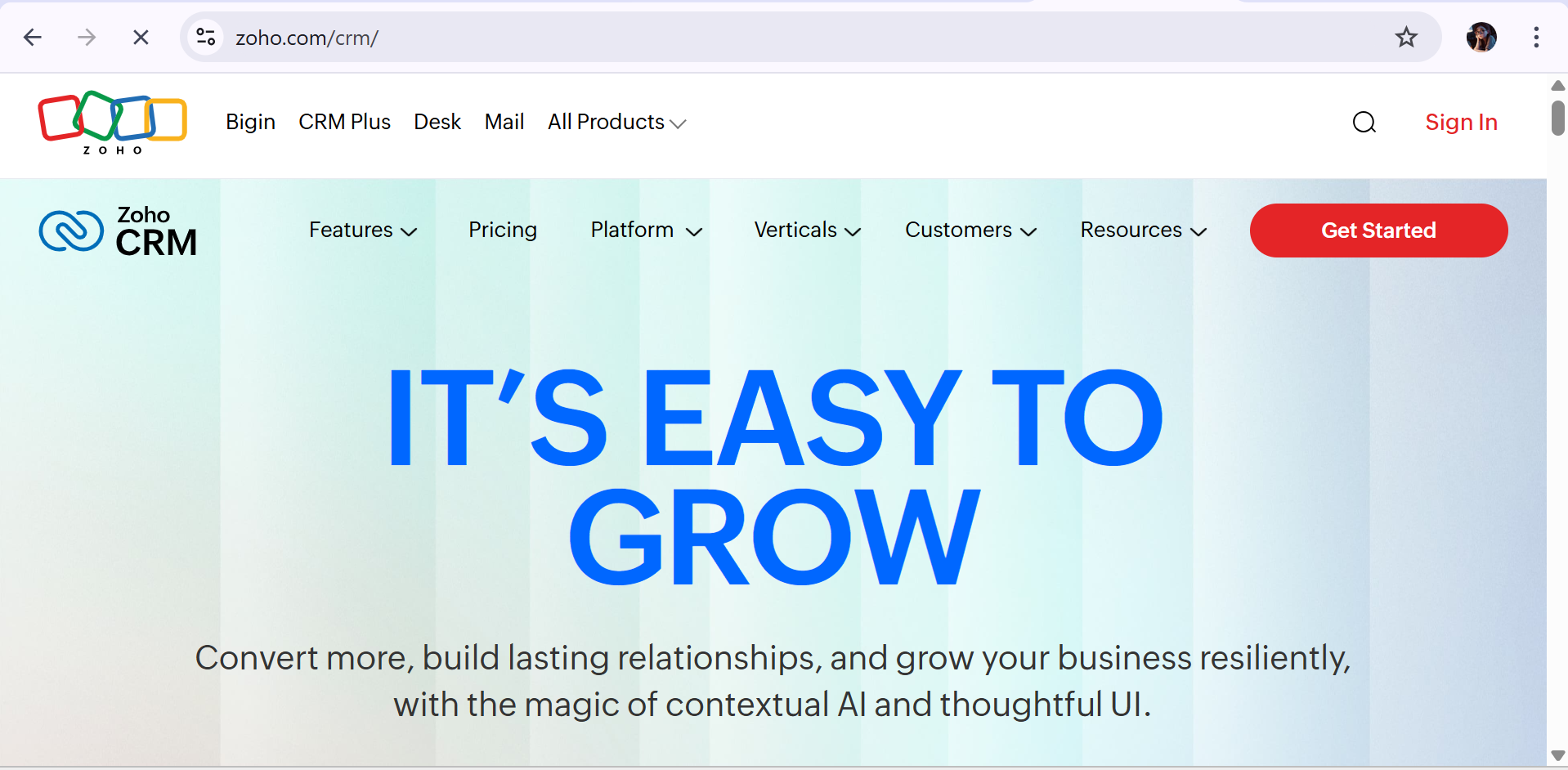
Review
Zoho CRM is a flexible, cloud-based CRM developed by Zoho Corporation. It is particularly appealing for agencies that want a cost-effective yet powerful solution. With support for omnichannel communication, automation, and AI-assisted insights (via Zia, Zoho’s AI), Zoho CRM helps agencies manage leads, clients and campaigns efficiently. It’s well-suited for medium-sized and growing agencies that want robust features without huge costs.
Features
- Lead and contact management
- Sales pipeline and deal management
- Workflow automation
- Omnichannel communication (email, social, chat)
- AI assistant for predictions and suggestions (Zia)
- Analytics and custom reports
Pros
- Affordable pricing for growing agencies
- Scalable with automation and AI features
- Good integration with other Zoho products
- Customizable modules for different agency processes
- Strong mobile app support
Cons
- Setup and customization may require time
- UI can feel less modern compared to some competitors
- Advanced features require higher-tier plans
- Learning curve for teams new to Zoho’s ecosystem
Final Verdict
Zoho CRM is a very strong choice for agencies that want a customizable and scalable CRM without the high cost of enterprise tools. Its AI capabilities and broad feature set make it a future‑proof option as your agency grows.
3. Salesforce Sales Cloud
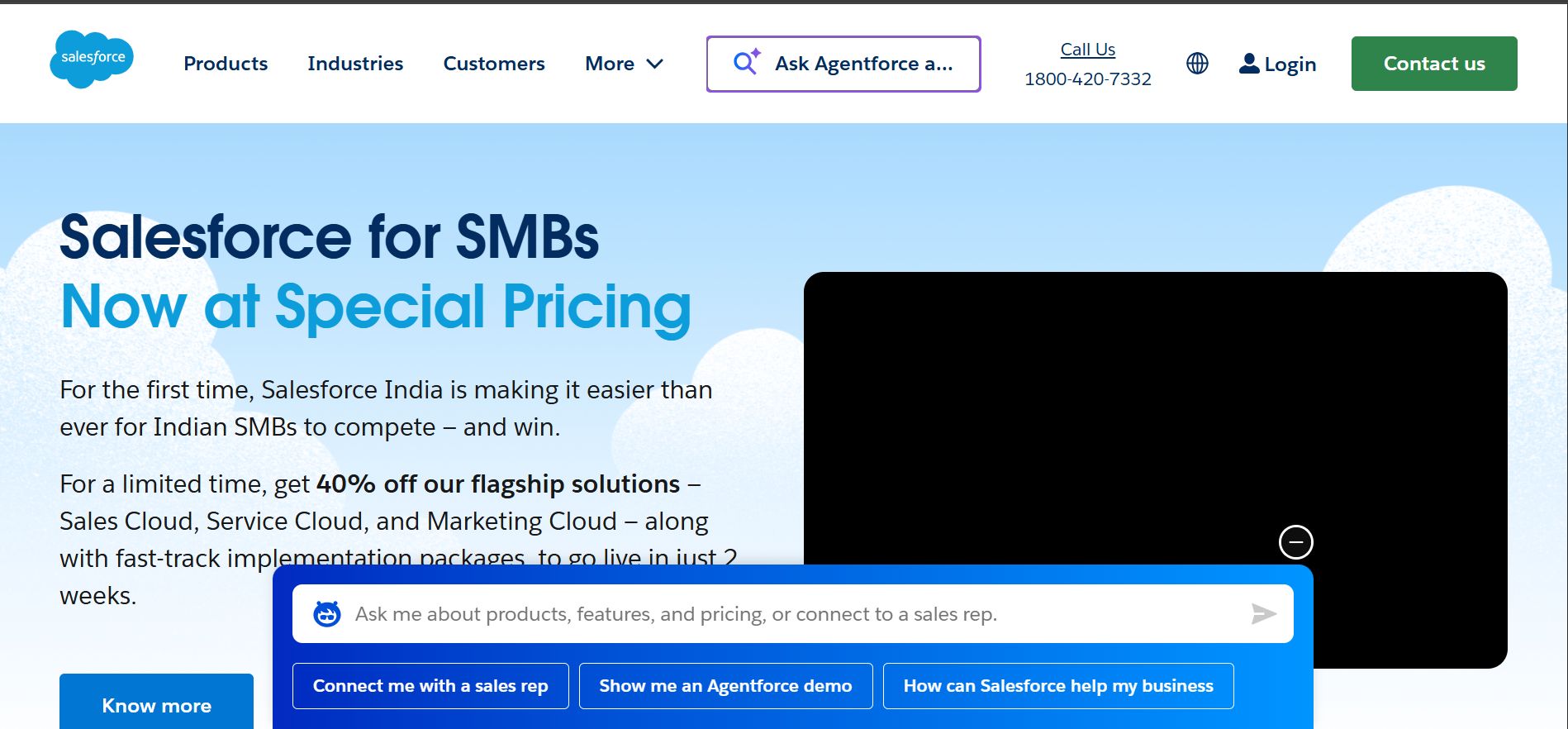
Review
Salesforce is the most well-known CRM in the world, and its Sales Cloud is highly powerful and configurable. For agencies, Salesforce offers unmatched customization and scalability, especially if you have complex processes, custom deal stages, and need to unify data across many clients. Its ecosystem (AppExchange) allows agencies to plug in many third‑party tools.
Features
- Customizable deal/opportunity pipelines
- Advanced reporting and dashboards
- AI-driven forecasting (Einstein)
- Custom objects and fields
- Integration with many enterprise tools
- Role‑based access control
Pros
- Highly scalable and configurable
- Powerful analytics and predictive AI
- Huge ecosystem of integrations
- Trusted enterprise-grade platform
- Flexible permissions and access control
Cons
- Very expensive for small agencies
- Requires dedicated admin expertise to configure
- Onboarding and deployment can be slow
- Complexity may overwhelm small teams
Final Verdict
Salesforce Sales Cloud is ideal for larger agencies or those with complex, multi-client workflows who need a highly-custom CRM. If cost is not a barrier, and you want maximum flexibility and power, Salesforce is unmatched but for smaller agencies it may be overkill.
4. Pipedrive
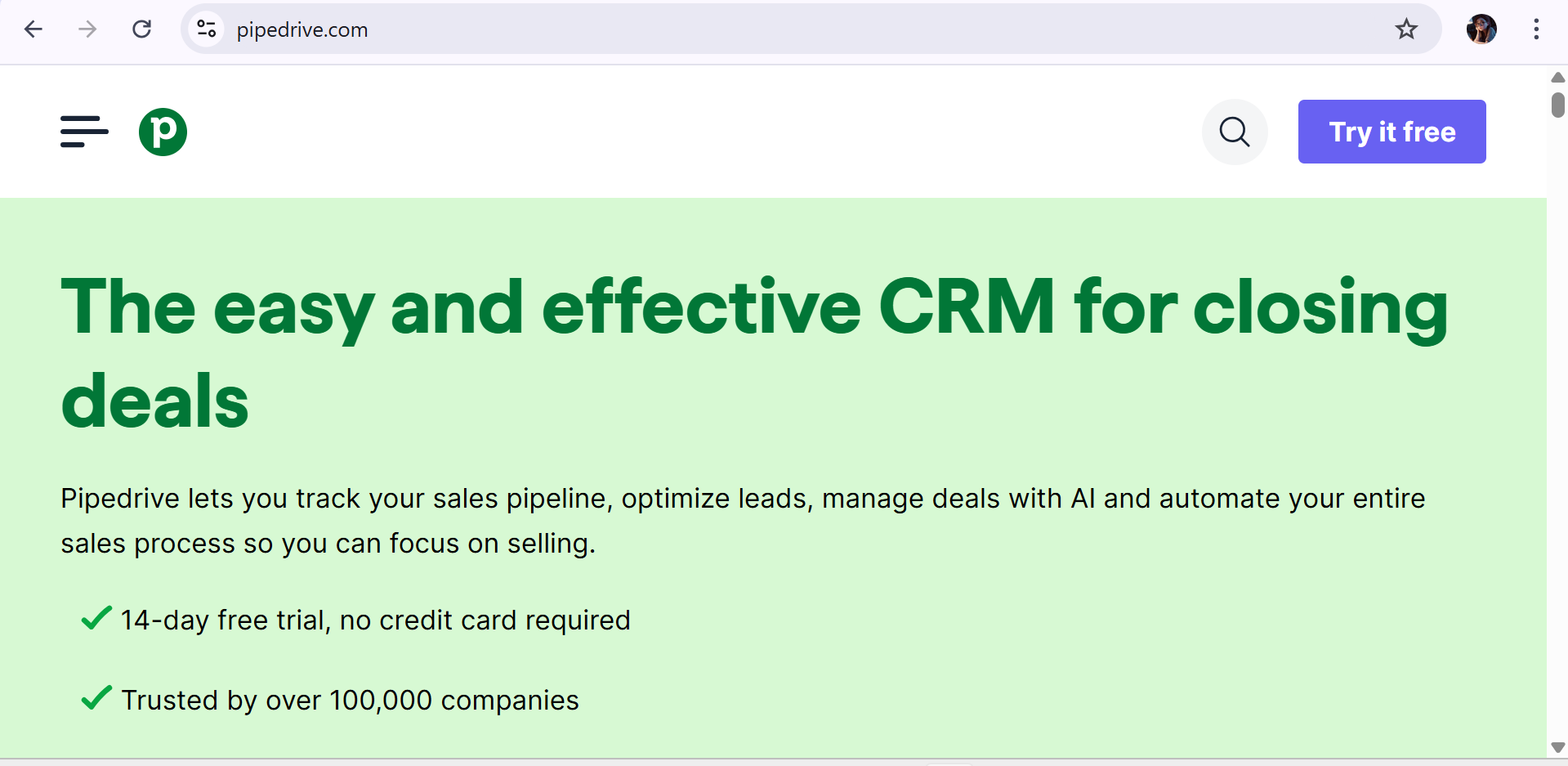
Review
Pipedrive is a CRM focused on sales pipeline management and is well-suited for agencies with strong sales workflows. It offers visual deal pipelines, good automation for follow-ups, and a user-friendly interface. Many marketing agencies pick Pipedrive because it simplifies deal tracking without dragging in too much overhead. According to multiple agency CRM guides, Pipedrive provides an efficient balance between simplicity and useful automation.
Features
- Visual sales pipelines
- Custom deal stages
- Email integration and tracking
- Activity reminders and scheduling
- Automation of repetitive tasks
- Simple reporting and forecasting
Pros
- Very intuitive and easy to use
- Great for sales-focused teams
- Affordable pricing
- Lightweight, not bloated with unnecessary features
- Excellent mobile app
Cons
- Not as feature-rich for project delivery or accounting
- Automation is somewhat limited compared to enterprise CRMs
- Reporting is not as deep as some competitors
- No built-in marketing automation
Final Verdict
Pipedrive is a smart pick for agencies whose priority is managing sales, leads, and pipeline efficiently. If your agency does not need heavy project management from its CRM, Pipedrive offers a streamlined yet powerful experience.
5. Monday.com CRM
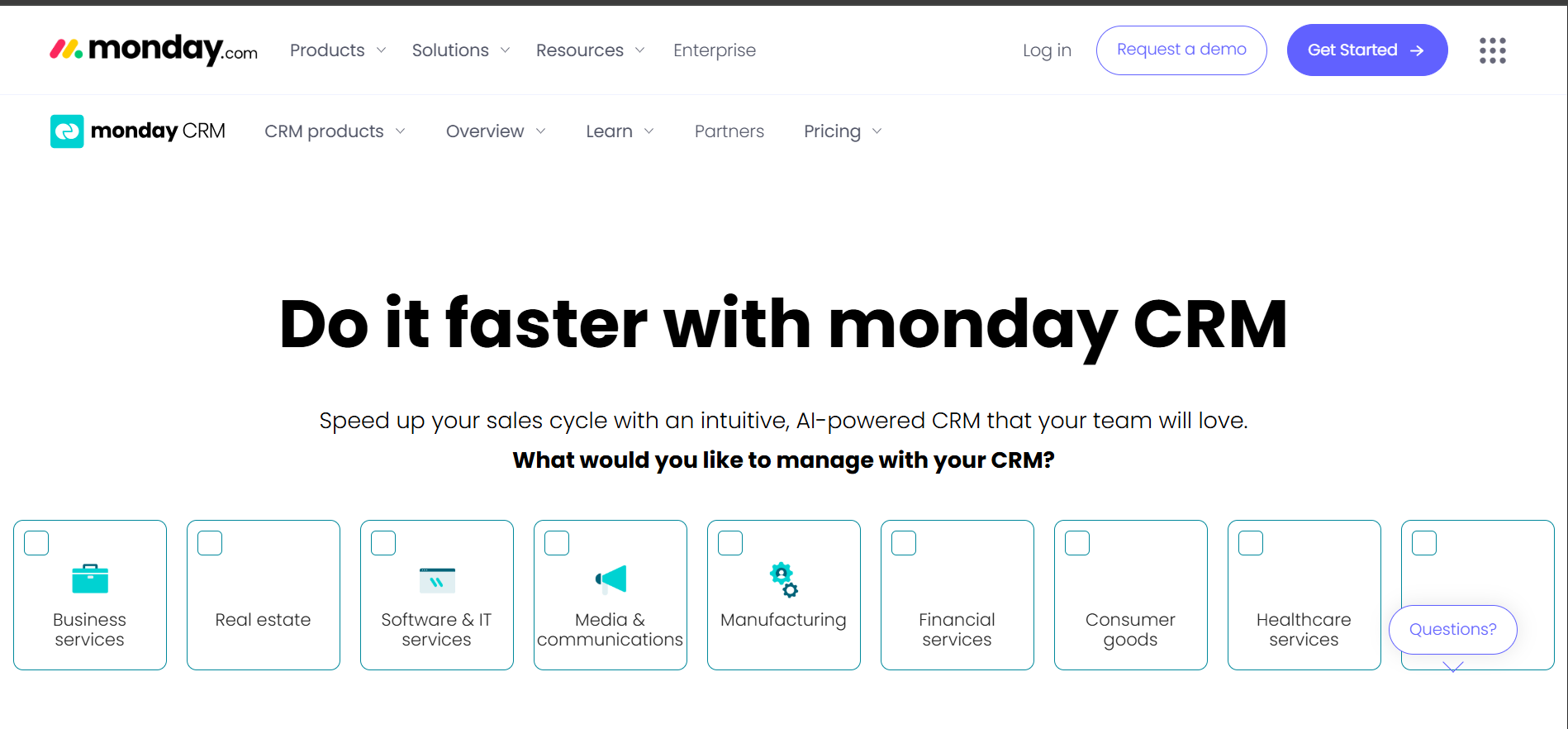
Review
Monday.com started as a project management tool but now provides a powerful CRM system that agencies can tailor. On Monday, agencies can build custom pipelines, set up boards for deals, tasks, and projects, and automate workflows. Because agencies often deliver projects, having CRM + project management in the same platform helps reduce tool sprawl. According to Supervisible, this consolidation is one of the biggest advantages for agencies.
Features
- Customizable pipeline boards
- Task and project management in same workspace
- Automation of repetitive tasks
- Integrations with email, calendar, and other tools
- Dashboards and reporting
- Permissions and roles per board
Pros
- All-in-one: CRM + project management
- Highly customizable to agency workflows
- Easy to visualize deals and tasks
- Good for collaboration across teams
- Flexible automations
Cons
- Setting up boards and workflows takes time
- Not a traditional CRM; some CRM features may feel limited
- Can become expensive with many users
- Reporting is good but less specialized for deep CRM metrics
Final Verdict
Monday.com CRM is great for agencies that want a unified system for both sales and delivery. It reduces the need to switch between tools, making workflows more efficient. Especially useful for agencies that manage their projects through Monday already.
6. Insightly
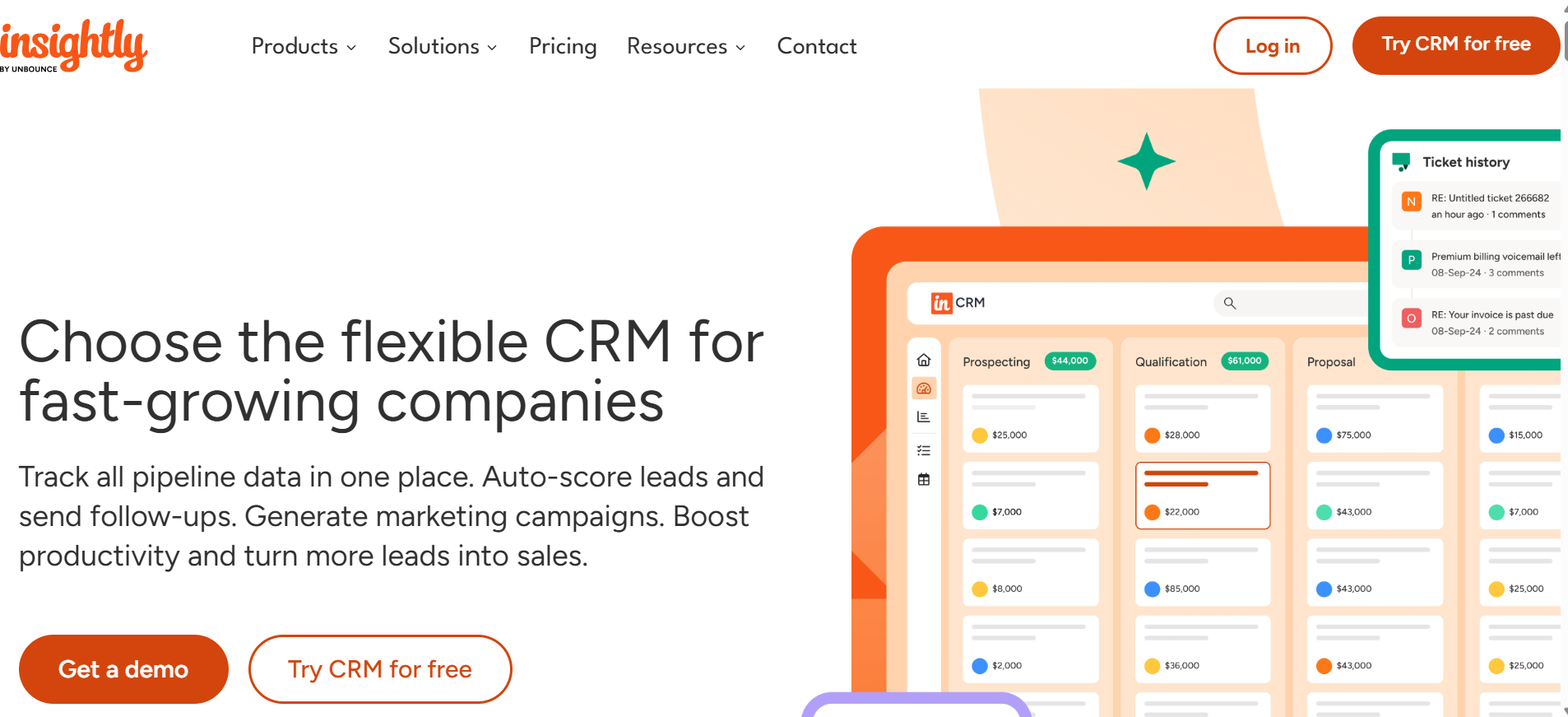
Review
Insightly combines CRM with project management capabilities, making it very suitable for agencies that need to manage both sales and service/delivery operations. Agencies can track client opportunities, link them to project milestones, and collaborate internally all from the same tool. According to SoftwareFinder, Insightly is a strong option for agencies that value reporting, automation, and a unified lead-to-delivery workflow.
Features
- Opportunity pipeline management
- Project management (tasks, milestones)
- Email tracking and templates
- Custom fields and objects
- Advanced reporting and dashboards
- Automation rules
Pros
- Seamless flow from sales to delivery
- Good visibility into projects and client work
- Customizable and scalable
- Integrates well with email and other tools
- Strong reporting for agencies
Cons
- Can be complex to configure initially
- Pricing can go up with more advanced features
- Interface is not the most modern compared to newer CRMs
- Some users report slower performance with very large datasets
Final Verdict
Insightly is a balanced CRM + project management tool that works very well for agencies with delivery teams. If you want a CRM where deals seamlessly convert into projects, Insightly is a solid choice.
7. SuiteCRM

Review
SuiteCRM is an open-source CRM platform, maintained by SalesAgility, that gives agencies full control over their data and customization. It’s particularly useful if your agency prefers to self-host or wants to build a very tailored CRM without paying subscription fees. Because it’s open source, agencies can adapt workflows, UI, and modules exactly as they need.
Features
- Contact, account, and opportunity management
- Custom modules and fields
- Reporting and dashboards
- Workflow automation
- Self-hosting or cloud deployment
- Open‑source codebase
Pros
- No licensing cost if self-hosted
- Highly customizable
- Data control you own your CRM data
- Flexible deployment options
- Large community support
Cons
- Requires technical resources for setup and maintenance
- No out-of-the-box polish compared to commercial CRMs
- Updates and upgrades need to be managed manually
- Hosting costs are borne by you
Final Verdict
SuiteCRM is ideal for agencies that want maximum flexibility and control. If you’re okay with handling hosting and maintenance, it’s a cost-effective and powerful solution — especially for agencies that want to deeply customize their CRM.
8. Capsule CRM
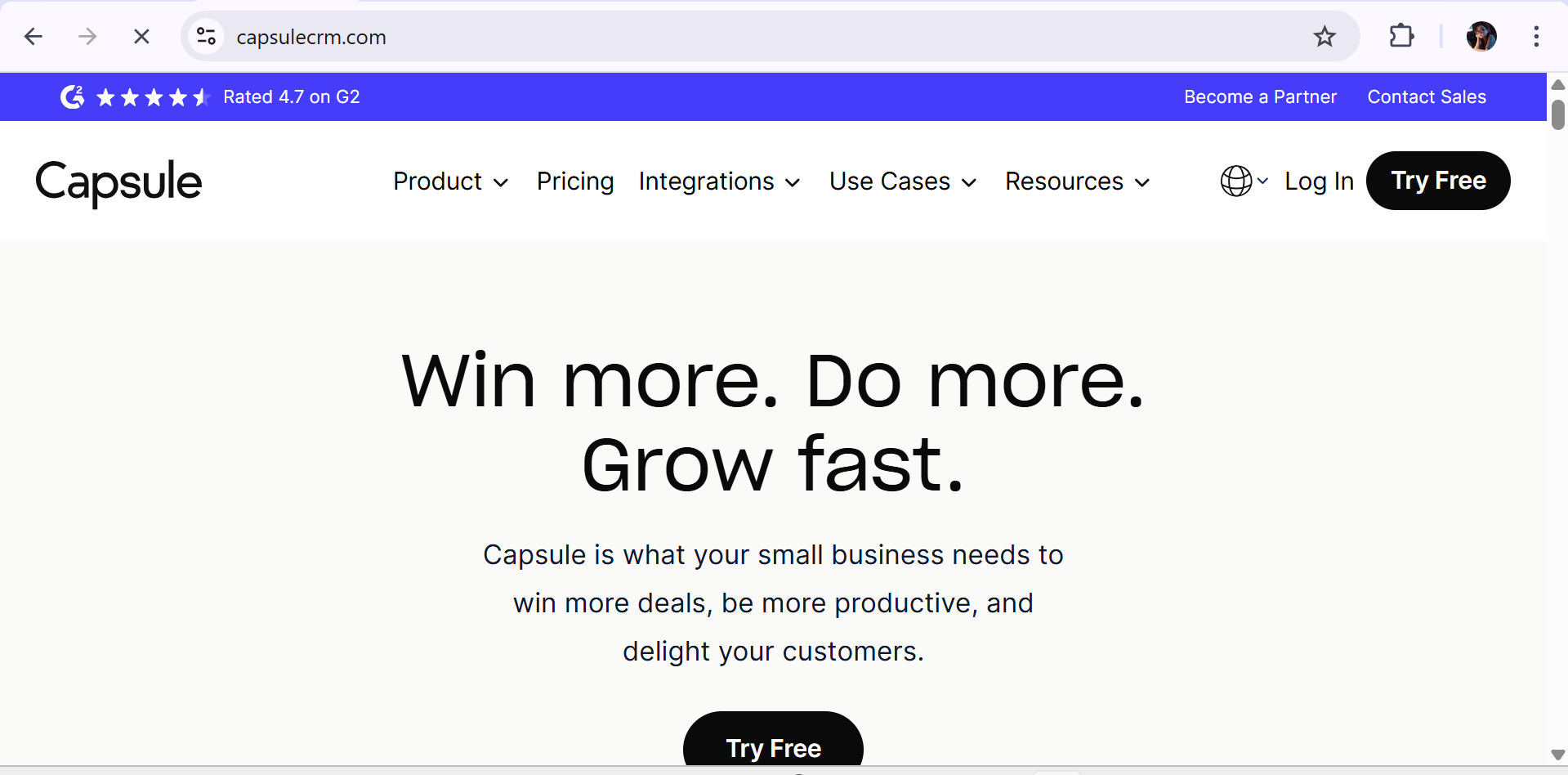
Review
Capsule is a simple, lightweight CRM that’s featured by HubSpot as one of the top CRM options for agencies. It is easy to use and integrates well with accounting tools, making it suitable for small to medium agencies that want to avoid over-complicated systems.
Features
- Contact & lead management
- Opportunity pipelines
- Email integration
- Task management & reminders
- Custom fields and tagging
- Reports and dashboard
Pros
- Very user-friendly and minimal learning curve
- Integrates with billing tools like Xero, QuickBooks
- Affordable for small teams
- Good for agency sales pipeline basics
- Clean UI and reliable performance
Cons
- Limited automation compared to other CRMs
- Not designed for complex project management
- Reporting is more basic
- Less suitable for high‑growth or large agencies
Final Verdict
Capsule CRM is a reliable pick for small agencies that prioritize simplicity and cost-effectiveness. It’s great for managing leads and opportunities without the bloat of larger CRMs.
9. GoHighLevel
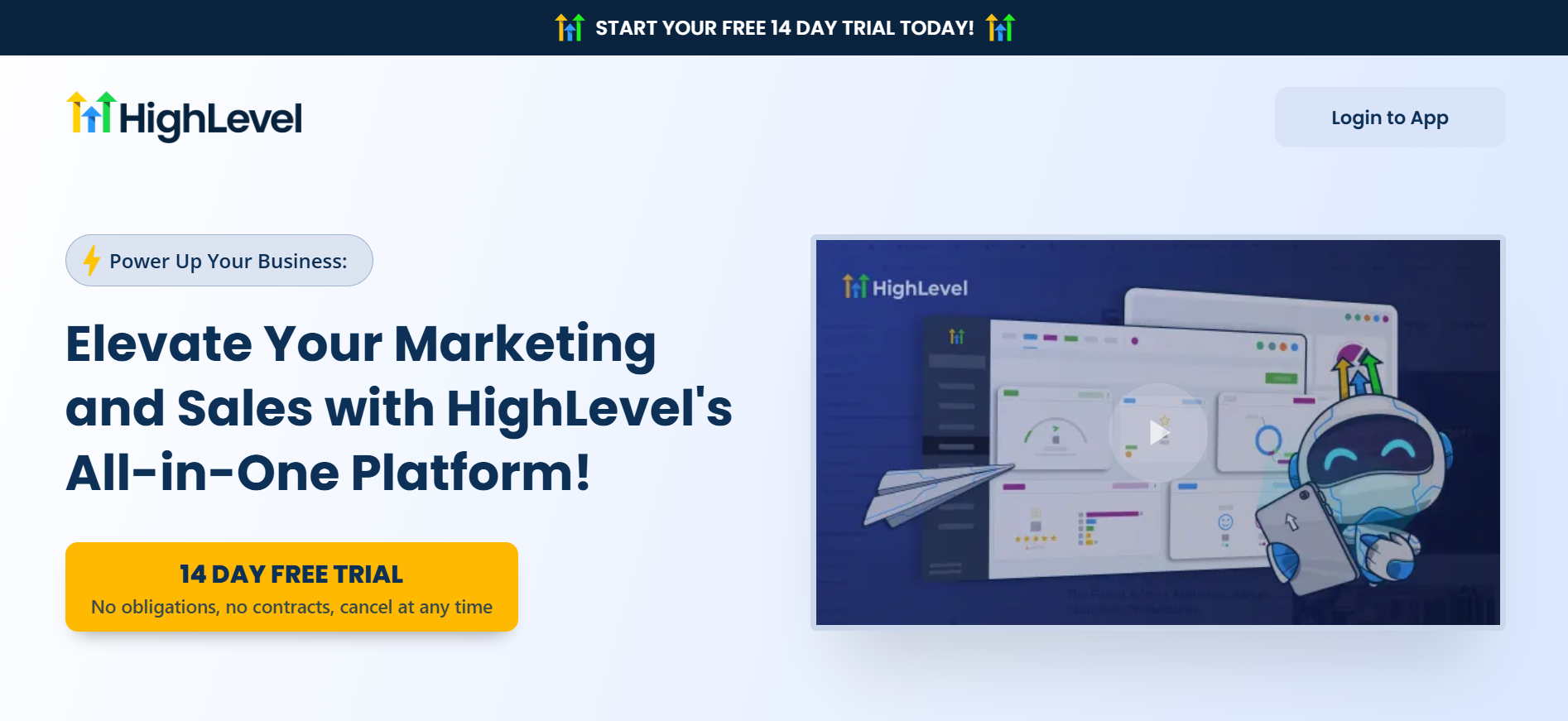
Review
GoHighLevel is a CRM built specifically for agencies. It combines CRM, marketing automation, client portals, booking, and funnels into one platform. Agencies love it because they can white‑label the entire system and offer it to their clients under their own brand. It reduces tool overload by merging lead capture, messaging (SMS, email, calls), and campaign workflows.
Features
- Lead capture via forms, surveys, calendars, landing pages
- Multi-channel messaging (SMS, email, voicemails, Facebook Messenger)
- White-label sub-accounts (resell as your own CRM)
- Automation workflows and follow-up sequences
- Client portal and membership area support
- Analytics and reporting for campaigns & clients
Pros
- True all-in-one platform for agencies (CRM + marketing + automation)
- White‑labeling gives you branding power
- Unlimited sub‑accounts make scaling for clients easy
- Automates repetitive tasks, reducing manual work
- Built-in funnel builder + booking + client portal
Cons
- Can be complex to learn for new users
- The cost is relatively high for unlimited accounts plan
- Some users report bugs or sync issues with external tools
- Reliance on HighLevel ecosystem may limit usage of other specialized tools
Final Verdict
GoHighLevel is a powerful CRM for agencies that want to run their entire business from one platform. If you’re serious about scaling, want to white-label your CRM for clients, and want to combine sales, marketing and service this is one of the best options. For smaller or more traditional agencies, the learning curve and cost may be trade‑offs, but the long-term benefits are strong.
10. Salesflare
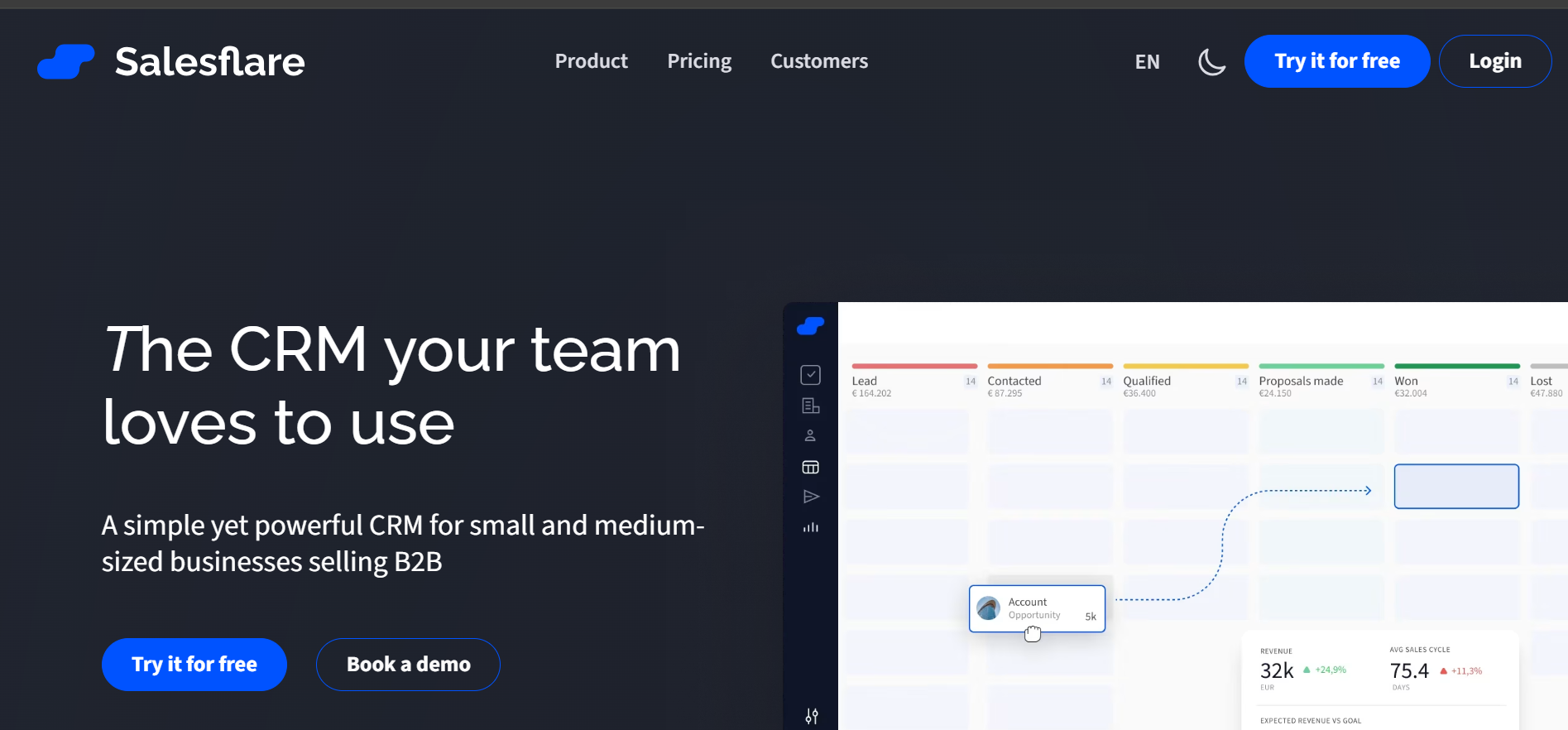
Review
Salesflare is a CRM known for its simplicity, automation, and intelligent lead tracking. It works especially well for B2B agencies that rely on sales relationships and outreach. According to Salesflare’s own blog, it’s designed to automatically enrich contact data, track email and LinkedIn activity, and let agencies follow up with minimal manual effort.
Features
- Automatic contact and company enrichment
- Email tracking (opens, replies)
- Activity reminders and pipeline management
- Smart follow-up suggestions
- Integration with Google Workspace, LinkedIn, and other tools
- Reporting dashboards
Pros
- Very user‑friendly and lightweight
- Saves time by automating data entry and follow-up
- Good for small to medium agencies focusing on outreach
- Affordable for what it offers
- Clean UI and minimal setup
Cons
- Lacks deep customization compared to enterprise CRMs
- Not built for managing delivery or project tasks
- May not scale as well for very large teams
- Reporting is basic compared to highly advanced CRMs
Final Verdict
Salesflare is a great pick if your agency is sales-driven and values automation over heavy customization. It helps your team follow up smarter and spend less time managing contact data. The platform’s clean interface makes it easy for teams to stay organized without feeling overwhelmed. Its smart workflows and time-saving features make it a powerful choice for agencies aiming to boost productivity and close more deals effortlessly.
Conclusion
In this extended list of 15 CRMs, you now have a wide variety of tools from white-label, all-in-one platforms like GoHighLevel, to AI-enhanced CRMs like Vtiger, to specialist tools like Salesflare and Breakcold. The right CRM for your agency depends on your workflow, your size, your budget, and how much automation vs customization you need.
If your agency handles both client acquisition and delivery, tools like Productive or GoHighLevel will give you end-to-end visibility. If you’re more focused on outbound sales, Salesflare or Breakcold might be more efficient. And if you’re cost-conscious but still want strong features, Capsule CRM is a great lightweight choice.
Frequently Asked Questions (FAQs)
What is the best CRM for small agencies?
For small agencies, ease of use, affordability, and core features matter most. HubSpot CRM and Capsule CRM are highly recommended because they offer free or low-cost plans, simple interfaces, and essential tools for managing leads and clients.
How do I choose the right CRM for my agency?
Choosing the right CRM involves evaluating your agency’s size, workflow, and priorities. Consider whether you need automation, project management, integrations, or white-labeling capabilities.
Can CRMs integrate with other tools used by agencies?
Yes, most modern CRMs offer integrations with email clients, marketing automation platforms, project management tools, and calendars.
Are these CRMs suitable for agencies with multiple clients and campaigns?
Absolutely. CRMs like GoHighLevel, Productive, and Monday.com are designed to handle multi-client workflows, pipelines, and projects simultaneously.
How much do agency CRMs typically cost?
Pricing varies widely depending on features, number of users, and automation capabilities. Free plans are available for CRMs like HubSpot, while advanced platforms like Salesforce or GoHighLevel may cost several hundred dollars per month for multiple users.
